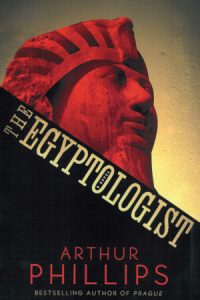Random House Interview
A conversation between Arthur Phillips, author of THE EGYPTOLOGIST, and Rex d’Eauboulé of the Random House Author-Interview Department.
Rd’E: Arthur! So now let us discuss this Egyptologist of yours, eh? Let’s start by separating fact and fiction.
AP: I don’t really want to. That’s no fun. I went to a lot of trouble to blur them. Isn’t the fun of fiction-especially fiction that is laid over historical fact-having a seamless finished product?
Rd’E: You are no less pretentious than in our last talk, Novelist. Now tell me about the god Atum.
AP: Atum was absolutely a god in the Egyptian pantheon. And while depictions of him varied, and there are different myths, the most common version of Egyptian Creation has Atum as the first god. He is alone. And he creates more gods by masturbating onto fertile soil, from which they then sprout. He is known as “the accomplished one,” which I think shows that the ancient Egyptians had a nice sense of priorities.
Rd’E: Now people will think you are pulling on their legs. But this is a true fact?
AP: Absolutely, as are some of the most remarkable drawings of Atum’s limber self-amusements. In Lise Manniche’s Sexual Life in Ancient Egypt, there are some reproductions of ancient art, and in one, Atum shows that he really merits the epithet “accomplished one.”
Rd’E: And the king who takes this god’s name, Atum-hadu or Atum-Is-Aroused? Is he historical?
AP: There has been no evidence yet for him.
Rd’E: The three fragments of his Admontions [see Glossary]?
AP: They have not yet been discovered, but I am hopeful. But it was not uncommon for kings to have a god’s name as part of their own, since the kings were on their way to becoming gods. Akhenaten, Tutankhamun, Djedefra-these mean “Beneficial to Aten” and “The Living Image of Amun” and “Ra Is His Strength”. So it is not unreasonable to think of a king with Atum-hadu’s history choosing to name himself, essentially, after the act of Creation.
Rd’E: We know, of course, that Howard Carter and Lord Carnarvon were real men.
AP: Yes. They forged one of the great partnerships in the history of the field, and their most thrilling accomplishment-the discovery of Tutankhamun’s tomb-really required both of them: a tireless, intelligent, intutitive explorer in Carter; and a patient, interested, rich backer. Still it took six years to find Tut’s tomb, and Carter was on the verge of giving up when they found that first stair. That story and Carter’s life are inspirational, even if you don’t have much interest in Egyptology.
Rd’E: You spoke of Lise Manniche. Did you do other research for the novel?
AP: Absolutely. A shelf full of Egyptology books. Correspondences with patient professionals at the British Museum, at the Theban Mapping Project, at the Griffith Institute at Oxford (which has Carter’s journals), and on and on. Experts in World War I, in shipping, in postal history, in tiger taming. I harassed a lot of people. That said, it didn’t feel like research. I did it as the need arose. The novel would have a blank space, labeled “insert research here” and then I’d go looking for my answer. That’s much more fun than doing a lot of research and then trying to write a story around it.
Rd’E: Let’s settle something. How long have you spent in Egypt?
AP: Four days. In 1991.
Rd’E: And Australia?
AP: To the best of my recollection, never.
Rd’E: The Egyptologist is a very different novel than Prague. Why?
AP: Why not? This is the idea that caught my attention, and that’s the main thing. I fear boredom. That’s why I’ve finagled a job where I get to sit around all day making things up. If I can keep myself entertained by a story for two or three years, then a reader has a fair chance of being entertained by it for a couple of weeks.
Rd’E: Do you have debts of influence in this book you will acknowledge? Which writers and which books were on your mind as you worked?
AP: I do have several such debts, and I do acknowledge them, but I have hidden my gratitude in the book itself, in various ways that amuse me. Much more fun that way.
Rd’E: Much more pretentious, you mean to say. Let’s try this: tell us about the XIIIth Dynasty.
AP: The 3000 and some years of Egyptian history have been divided into dynasties, more or less logical groupings of rulers. Some of those dynasties were periods of growth and strength, others were times of collapse. The XIIIth was a period of collapse, and because of that, our knowledge of the time is very uncertain. We aren’t sure about the names of the kings, or their order. We know that someone seems to have invaded and conquered Egypt, but we’re not sure of the precise date, or how much resistance there was, or who was allied with these invaders. Historical clarity returns only at the end of the XVIIth Dynasty, which is the time of restoration of the legitimate kingship. But the XIIIth appealed to me artistically, as the setting for part of the story, and as a likely place for us to find the history of Atum-hadu.
Rd’E: And the theme of immortality? Do you think this means anything to modern people?
AP: Of course. It’s most obvious in religion, naturally, but that desire is everywhere, in the blood of atheists, too, in our approach to work, to building, to our children. Once you open your eyes to it, you see it everywhere: people unconsciously and consciously strive for an immortality they know they cannot have, and make themselves feel they will have it if their work or lives are remembered, if their money carries on their name, if their beloved institutions live on.
Rd’E: And novelists are the worst of this sort.
AP: Of course.

